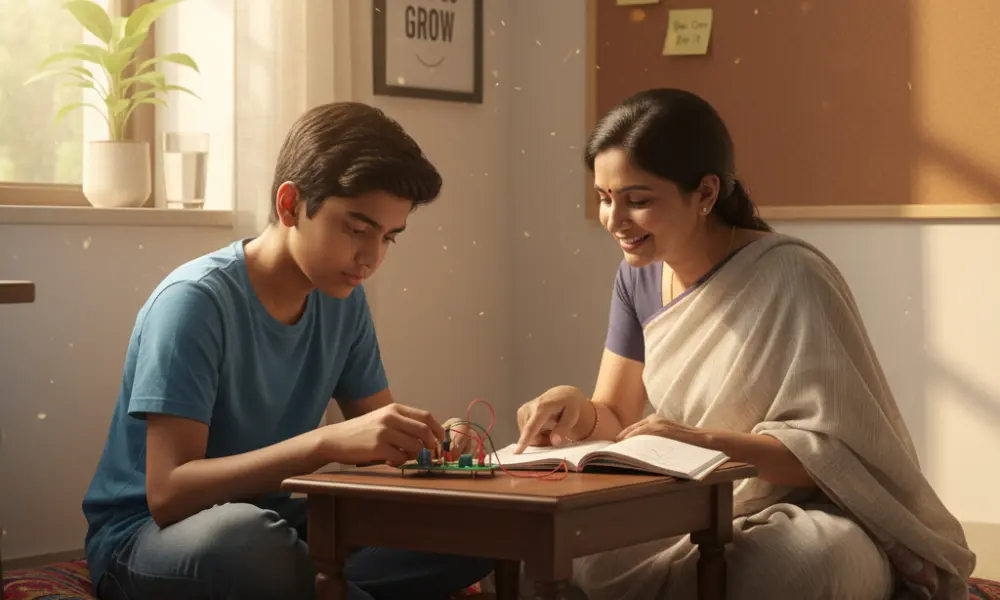Support your child’s learning without turning encouragement into stress
Indian parents play a pivotal role in shaping their child’s academic journey, but striking the right balance between support and pressure is key. This blog offers evidence-based insights and practical strategies to help parents become effective, encouraging partners in learning — without creating undue stress. From communication to environment and goal-setting, discover how to nurture academic success the right way.

In many Indian households, academic success is often seen as a gateway to a secure future. While this intention is rooted in love and care, it can inadvertently lead to overwhelming pressure on students. Support means guiding, encouraging, and listening — not micromanaging every test or assignment. When parental involvement becomes controlling, it risks damaging the child’s confidence and interest in learning.
Support uplifts, but pressure can paralyze. The difference lies in intention and tone.
Studies have shown that students who feel emotionally supported by their parents are more likely to perform better academically and demonstrate higher levels of self-esteem and motivation.
Every student has a preferred way of processing information. Some learn visually, others need to write things down or talk them out. Recognizing your child’s learning style can help you tailor your support meaningfully. Instead of enforcing a rigid method, observe what helps your child remember better or stay focused longer. Tools like Edzy’s gamified revision system can adapt to different learning preferences.
Visual learners benefit from charts and diagrams
Auditory learners thrive with explanations and discussions
Kinesthetic learners understand best through hands-on activities
The physical and emotional environment at home matters. A calm, organized space with minimal distractions can greatly improve focus. But beyond furniture and lighting, the emotional climate is key — replace fear of failure with encouragement and trust.
Set a daily study routine, but include breaks and fun
Ensure noise-free zones during study time
Keep open shelves for books and resources within reach
Make sure the environment doesn’t resemble an exam hall every day. Let learning feel natural, not forced.
Teenagers crave independence, but also seek validation. The way you speak about academics can either build bridges or walls. Avoid comparisons and instead ask open-ended questions like “What do you think helped you improve in math this week?” rather than “Why didn’t you score 90% again?”
Listen more than you speak
Validate their feelings without judgement
Use ‘I’ statements instead of accusations
Consistent, calm communication fosters trust and gives your child the confidence to express their struggles and wins.
High expectations are fine — unrealistic ones are not. Instead of setting one-size-fits-all benchmarks, personalize goals based on your child’s ability, interest, and academic level. Avoid over-scheduling and respect their mental bandwidth.
Break larger academic goals into achievable weekly or monthly milestones. Apps like Edzy help track this progress and offer motivation boosts in real-time.
Results matter, but they should never overshadow effort. When a student knows their hard work will be appreciated even if the marks aren’t perfect, they’re more likely to take academic risks and try harder next time.
Celebrate the process — finishing a tough chapter, overcoming procrastination, or submitting work on time — not just the final score.
Praise persistence and progress, not just performance.
Academic journeys aren’t linear. Students face failures, stress, peer pressure, and burnout. As a parent, your role is to model emotional regulation and help your child develop coping mechanisms. Teaching them to bounce back from setbacks is more valuable than a perfect report card.
Encourage self-reflection after mistakes
Teach deep-breathing or journaling to manage anxiety
Reframe failure as a stepping stone, not a stop sign
A child who can manage their emotions will always be better equipped to handle academic and life challenges.
Teachers are not just evaluators — they’re partners in your child’s growth. Attend PTMs, ask insightful questions, and share your child’s learning style or home concerns if needed. Maintain open communication without being overbearing.
At Edzy, we encourage a triangle of trust between student, parent, and educator — one where communication flows smoothly, roles are respected, and everyone focuses on the child’s holistic development.
Partnership over pressure — that’s how parents make the biggest difference.

Screen Time Management for Students: A Parent’s Step-by-Step Guide
A comprehensive guide for parents to manage their children's screen time effectively.

How Parents Can Build a Growth Mindset in Their Children
Empower your child with a growth mindset for lifelong learning.

Peer Pressure vs Healthy Competition – Helping Your Child Stay Motivated
How to differentiate peer pressure from healthy competition and guide your child toward positive motivation

The Role of Parents in Building Exam Confidence: Do’s and Don’ts
Practical do’s and don’ts for parents to boost their child’s exam confidence